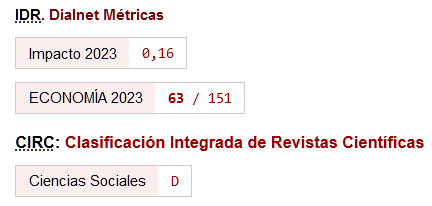Empirismo en economía ecológica:una visión desde la teoría de los sistemas complejos
Keywords:
Ecological economics, Neo-classical environmental economics, Empiricism, Predictive analysis, Complexity, Post-normal scienceAbstract
Economies are open complex adaptive systems farfrom thermodynamic equilibrium, and neo-classical environmental. economics is not the best way to describe the behaviour of such sys-tems. Standard econometric analysis takes a deterministic and predic-tive approach, which encourages the search for predictive policy tocorrect environmental problems. Rather, it seems that, because of thecharacteristics of economic systems, an ex-post analysis is moreappropriate, which describes the emergence of such systems proper-ties, and which sees policy as a social steering mechanism. With thisbackground, some of the recent empirical work published in the fieldof ecological economics that follows the approach defended here ispresented. Finally, the conclusion is reached that a predictive use ofeconometrics in ecological economics is not possible. However, thatdoes not mean we should not use empirical analysis. On the contrary,this is to be encouraged, but from a structural and ex-post point ofview.
Downloads
References
Beard, T.R. y Lozada, G.A. (1999): Economics, Entropy and the Environment. The Extraordinary Economics of Nicholas Georgescu-Roegen. Edward Elgar. Cheltenham, UK. https://doi.org/10.4337/9781035303977
Boulding, K.E. (1987): "The epistemology of complex systems", European Journal of Operational Research, 30: 110-116. https://doi.org/10.1016/0377-2217(87)90087-7
Casler, S.D., Blair, P.D. (1997): "Economic structure, fuel combustion, and pollution emissions", Ecological Economics22: 19-27. https://doi.org/10.1016/S0921-8009(96)00551-4
Clark, N.; Pérez-Trejo, F.; Allen, P. (1995): Evolutionary Dynamics and Sustainable Development: A Systems Approach. Edward Elgar. Aldershot, UK. https://doi.org/10.4337/9781035334605
Daly, H.E. (1992): Steady-State Economics. Earthscan Publications. London.
De Bruyn, S.M., Opschoor, J.B. (1997): "Developments in the throughput-income relationship: theoretical and empirical observations", Ecological Economics20: 255-268. https://doi.org/10.1016/S0921-8009(96)00086-9
Faber, M. y Proops, J.L.R. (1998): Evolution, Time, Production and the Environment. Springer, Berlin.
Faber, M.; Manstetten, R.; Proops, J.L.R. (1996): Ecological Economics: Concepts and Methods. Edward Elgar. Cheltenham.
Falconi-Benitez, F. (2001): "Integrated assessment of the recent economic history of Ecuador", Population and Environment22 (3): 257-280. https://doi.org/10.1023/A:1026647829660
Funtowicz, S.O.; Ravetz, J.R. (1991): "A new scientific methodology for global environmental issues", in Costanza, R. (Ed.): Ecological Economics: The Science and Management of Sustainability. Columbia University Press, New York.
Funtowicz, S.O.; Ravetz, J.R. (1994): "The worth of a songbird: Ecological economics as a post-normal science", Ecological Economics, 10: 197-207. https://doi.org/10.1016/0921-8009(94)90108-2
Georgescu-Roegen, N. (1971): The Entropy Law and the Economic Process. Harvard University Press, Cambridge, Massachusetts. https://doi.org/10.4159/harvard.9780674281653
Giampietro, M. y Mayumi, K. (2000 a): "Multiple-scale integrated assessment of societal metabolism: Introducing the approach", Population and Environment22 (2): 109-153.
Giampietro, M. y Mayumi, K. (2000b): "Multiple-scale integrated assessment of societal metabolism: Integrating biophysical and economic representations across scales", Population and Environment22 (2): 155-210.
Gleick, J. (1987): Chaos: Making a New Science. Penguin, Harmondsworth.
Gomiero, T. y Giampietro, M. (2001): "Multiple-scale integrated analysis of farming systems: The Thuong Lo Commune (Vietnamese Uplands) case study", Population and Environment22 (3): 315-352. https://doi.org/10.1023/A:1026624630569
Gould, S.J. (1992): "Life in punctuation", Natural History, 101: 10-21. https://doi.org/10.2134/jnrlse.1992.0101
Haken, H., Knyazeva, H. (2000): "Arbitrariness in nature: synergetics and evolutionary laws of prohibition", Journal for General Philosophy of Science31: 57-73. https://doi.org/10.1023/A:1008369525041
Hall, C.A.S., Cleveland, C.J., Kaufmann, R.K. (1986): The Ecology of the Economic Process: Energy and Resource Quality. John Wiley & Sons, New York.
Heckman, J.J. (2001): "Econometrics and empirical economics", Journal of Econometrics100: 3-5.
https://doi.org/10.1016/S0304-4076(00)00044-0
Jackson, T., Marks, N. (1999): "Consumption, sustainable welfare and human needs - with reference to UK expenditure patterns between 1954 and 1994, Ecological Economics28(3): 421-441.
https://doi.org/10.1016/S0921-8009(98)00108-6
Kay, J.J., Regier, A.H., Boyle, M., Francis, G. (1999): "An ecosystem approach for sustainability: addressing the challenge for complexity", Futures31: 721-742. https://doi.org/10.1016/S0016-3287(99)00029-4
Kay, J.J., y Regier, H. (2000): "Uncertainty, complexity, and ecological integrity: insights from an ecosystem approach", in P. Crabbé, A. Holland, L. Ryszkowski y L. Westra (eds): Implementing Ecological Integrity: Restoring Regional and Global Environmental and Hunab Health, Kluwer, NATO Science Series, Environmental Security. Dordrecht. https://doi.org/10.1007/978-94-011-5876-3_9
Leontief, W.W. (1941): The Structure of American Economy1919-1929. Harvard University Press, Cambridge, MA.
O'Riordan, T. (1996): "Democracy and the sustainable transition", in Lafferty, W.M. & J. Meadowcroft (Eds.): Democracy and the Environment. Problems and Prospects. Edward Elgar: Cheltenham.
Pastore, G., Giampietro, M. y Mayumi, K. (2000): "Societal metabolism and multiple-scale integrated assessment: Empirical validation and examples of application", Population and Environment22 (2), 211-254.
Prigogine, I. (1987): "Exploring complexity", European Journal of Operational Research, 30: 97-103.
https://doi.org/10.1016/0377-2217(87)90085-3
Ramos-Martin, J. (1999): "Breve comentario sobre la desmaterialización en el estado español", Ecología Política, 18: 61-64.
Ramos-Martin, J. (2001 a): Historical analysis of energy intensity of Spain: From a "conventional view" to an "integrated assessment", Population and Environment22 (3): 281-313. https://doi.org/10.1023/A:1026672513730
Ramos-Martin, J. (2001b): "Non-linearity in energy metabolism of Spain: 'Attractor Points' for the Development of Energy Intensity", in S. Ulgiati et al. (ed.s), Advances in Energy Studies. Exploring Supplies, Constraints, and Strategies, Padova (Italy), Modesti Publisher.
Ramsay, J. (1998): "Problems with empiricism and the philosophy of science: implications for purchasing research", European journal of Purchasing & Supply Management4: 163-173. https://doi.org/10.1016/S0969-7012(97)00024-5
Rosen, R. (1987): "On complex systems", European Journal of Operational Research, 30: 129-134.
https://doi.org/10.1016/0377-2217(87)90089-0
Rothman, D.S. (1998): "Environmental Kuznets curve - real progress or passing the buck? A case for consumption-based approaches", Ecological Economics25: 177-194. https://doi.org/10.1016/S0921-8009(97)00179-1
Ruth, M. (1993): Integrating Economics, Ecology and Thermodynamics. Kluwer, Dordrecht.
https://doi.org/10.1007/978-94-017-1899-8
Simon, H.A. (1983): Reason in Human Affairs. Stanford University Press, Stanford.
Suri, V., Chapman, D. (1998): "Economic growth, trade and energy: implications for the environmental Kuznets curve", Ecological Economics25: 195-208. https://doi.org/10.1016/S0921-8009(97)00180-8
Unruh, G.C., Moomaw, W.R. (1998): "An alternative analysis of apparent EKC-type transitions", Ecological Economics 25: 221-229. https://doi.org/10.1016/S0921-8009(97)00182-1
Downloads
Published
How to Cite
Issue
Section
License
This licence allows third parties to share (copy and redistribute the material in any medium or format) and adapt (remix, transform and create from the material for any purpose, including commercial purposes), provided that authorship and first publication in this journal (The Journal, DOI of the work) is acknowledged, a link to the licence is provided, and it is stated whether changes have been made to the work.







